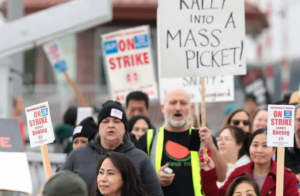Boeing says it aims to secure up to $35bn (£26.8bn) in new funding from investors and banks as a costly strike by thousands of its workers enters its second month.
Also on Tuesday, the union representing more than 30,000 of the aviation giant’s workers held a rally in the city of Seattle.
The company is moving ahead with plans to lay off around 17,000 workers, with the first redundancy notices expected to be issued in mid-November.
Talks to end the walkout collapsed last week as the firm withdrew an offer that included a 30% pay rise over four years.
Boeing plans to raise up to $25bn in stock and debt offerings and said it had reached a deal with major banks to borrow as much much as $10bn.
“These are two prudent steps to support the company’s access to liquidity,” Boeing said in a statement.
The company’s shares rose by 2.2% after the announcements.
The moves to raise new funding came just days after Boeing announced it would cut its workforce by 10% and said it expected to record a loss for the last three months.
BBC News understands that the layoffs will, for now, not affect striking workers.
The redundancies will be compulsory and workers will be offered severance payments.
The company also said deliveries of its 777X planes would be delayed by a year.
Boeing is due to release its quarterly results on 23 October.
Major credit ratings agencies had previously warned that the strike could lead to downgrades, which would make it more expensive for the company to borrow money.
S&P Global estimated the strike is costing Boeing around $1bn a month.
The walkout, at a company of major importance to the US economy, has become a source of concern for the Biden administration.
On Monday, acting US Labor Secretary, Julie Su, met representatives of the International Association of Machinists and Aerospace Workers union (IAM) and Boeing executives in Seattle.
Meanwhile, top Washington state Congressional Democrats have called on Boeing and IAM to “redouble… efforts to reach a mutually beneficial resolution.”
BBC

